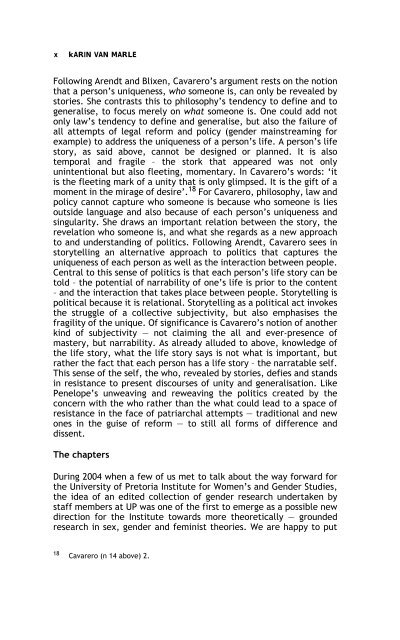Sex, Gender, Becoming - PULP
Sex, Gender, Becoming - PULP
Sex, Gender, Becoming - PULP
You also want an ePaper? Increase the reach of your titles
YUMPU automatically turns print PDFs into web optimized ePapers that Google loves.
x<br />
kARIN VAN MARLE<br />
Following Arendt and Blixen, Cavarero’s argument rests on the notion<br />
that a person’s uniqueness, who someone is, can only be revealed by<br />
stories. She contrasts this to philosophy’s tendency to define and to<br />
generalise, to focus merely on what someone is. One could add not<br />
only law’s tendency to define and generalise, but also the failure of<br />
all attempts of legal reform and policy (gender mainstreaming for<br />
example) to address the uniqueness of a person’s life. A person’s life<br />
story, as said above, cannot be designed or planned. It is also<br />
temporal and fragile – the stork that appeared was not only<br />
unintentional but also fleeting, momentary. In Cavarero’s words: ‘it<br />
is the fleeting mark of a unity that is only glimpsed. It is the gift of a<br />
moment in the mirage of desire’. 18 For Cavarero, philosophy, law and<br />
policy cannot capture who someone is because who someone is lies<br />
outside language and also because of each person’s uniqueness and<br />
singularity. She draws an important relation between the story, the<br />
revelation who someone is, and what she regards as a new approach<br />
to and understanding of politics. Following Arendt, Cavarero sees in<br />
storytelling an alternative approach to politics that captures the<br />
uniqueness of each person as well as the interaction between people.<br />
Central to this sense of politics is that each person’s life story can be<br />
told – the potential of narrability of one’s life is prior to the content<br />
– and the interaction that takes place between people. Storytelling is<br />
political because it is relational. Storytelling as a political act invokes<br />
the struggle of a collective subjectivity, but also emphasises the<br />
fragility of the unique. Of significance is Cavarero’s notion of another<br />
kind of subjectivity — not claiming the all and ever-presence of<br />
mastery, but narrability. As already alluded to above, knowledge of<br />
the life story, what the life story says is not what is important, but<br />
rather the fact that each person has a life story – the narratable self.<br />
This sense of the self, the who, revealed by stories, defies and stands<br />
in resistance to present discourses of unity and generalisation. Like<br />
Penelope’s unweaving and reweaving the politics created by the<br />
concern with the who rather than the what could lead to a space of<br />
resistance in the face of patriarchal attempts — traditional and new<br />
ones in the guise of reform — to still all forms of difference and<br />
dissent.<br />
The chapters<br />
During 2004 when a few of us met to talk about the way forward for<br />
the University of Pretoria Institute for Women’s and <strong>Gender</strong> Studies,<br />
the idea of an edited collection of gender research undertaken by<br />
staff members at UP was one of the first to emerge as a possible new<br />
direction for the Institute towards more theoretically — grounded<br />
research in sex, gender and feminist theories. We are happy to put<br />
18 Cavarero (n 14 above) 2.
















